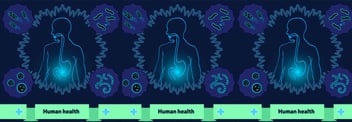The DNA of Emotional Health – Part 5 You Eat What You Are: How Genes in 32 Trillion Cells Can Sabotage Your Self-Esteem
- Home
- Blog

“The gene provides an organizing principle for modern biology—and it tantalizes us with the prospect of controlling our bodies and fates.”
– Siddhartha Mukherjee, M.D.
A Grand Orchestral Symphony Lives Inside You!
Reader, I have an admission to make: Sometimes, I get so lost in thought that I completely forget my surroundings. Thanks to the normalization of incessant screen time, I often feel my mind lives on the screen more than it lives in my body. Never before in history has it been so easy to sit all day and still be “productive”—this is all the more evident when we consider how difficult it feels to get those 10,000 steps in! Our ability for our minds to do much of our daily work has led to a certain kind of alienation or detachment from our physical selves. Rather than identifying with our bodies, we seek to objectify them. Rather than give our bodies nourishment and care, we obligingly lug ourselves to the gym to gain the perceived social benefits of an attractive physique. It’s a sad cycle: objectification of our bodies can lead to feelings of shame when whatever set standard is not reached, which can lead to further alienation as we cope with junk food or other unhealthy habits. Reader—does this sound familiar? If your answer is yes, then you’ve come to the right blog. While it may be easy to feel our thoughts or our selves are not connected to our physical presence, this simply could not be further from the truth. You may have heard of the mind-body connection—but what you may not know is that this connection is genetically wired into your biology. This week, I want to reconnect your wandering mind with feelings of wonder and awe over the body that gives it life.
Let’s pause for a moment to consider our wonderous, magnificent body. I think of it as a grand orchestral symphony. Why? Inside each of our 32 trillion cells resides up to 2 trillion molecules, all interacting with one another according to a grand “musical composition.” And those 32 trillion cells all interact with one another within interrelated biological systems, again highly orchestrated. And inside each of our brains resides billions of cells, and trillions of synaptic connections, all marvelously synchronized! And our DNA is both the COMPOSER and the CONDUCTOR of this astonishingly complex symphony! But what happens to our emotional health when the harmony is disrupted, when the euphonious music becomes cacophonous?
You Eat What You Are: How MCR4, FTO, and PPARG Gene Variants May Lead to Unhealthy Mind-Body Outcomes
With our minds overworked and our bodies under-stimulated, it’s no wonder that obesity levels keep rising. In no small part due to the objectification of our bodies in our society, popular culture has a frustrating proclivity to focus only on the aesthetics of this issue. All bodies are magnificent—but the simple truth is, obesity is but a symptom of a larger health issue that affects the lives of nearly a quarter of adults in America: Metabolic Syndrome. This syndrome can lead to a higher risk of cardiovascular disease, stroke, diabetes, and other diseases—but it can also lead to mental health concerns. Weight gain leads to insulin resistance. Insulin is a crucial hormone in our bodies that allow us to process sugar, or glucose, for energy, or store it for future use. If your body develops insulin resistance, it becomes more difficult for you to process sugar as energy. Instead, your body continues to store it as fat, helping to develop a vicious cycle. Insulin resistance leads to both physical and mental fatigue—which can in turn develop into more serious mood disorders.
If reading these negative health affects makes you feel guilty, then my heart goes out to you. When it comes to weight gain or weight loss, our meritocratic culture often places the blame or praise squarely on the individual—we view them through a moralistic lens, as if all weight loss takes is willpower or determination, and all weight gain takes is laziness, apathy, or a weak will. Reader, put very simply: we give our minds way too much credit sometimes! The biopsychosocial model helps us understand that it is never just one factor, but rather a whole slew of variables, from our minds to our neighborhoods to our genes.
Three gene variants in particular can leave individuals vulnerable to a higher likelihood of metabolic syndrome and weight gain—and can make it harder to take the weight off. Our MC4R gene helps our bodies regulate energy, homeostasis, food intake, and body weight. A variant on this gene can result in the dysregulation of satiety, making it harder to feel full and easier to feel hungry. A variant of the FTO gene has long been correlated with higher obesity rates, as well as elevations in fasting insulin, fasting glucose, and elevated serum lipids. Lastly, our PPARG gene is involved in regulating biological processes like lipid and glucose metabolism, and contributes to energy homeostasis. PPARG also plays a role in our inflammatory response. A particular variant on this gene has been shown to alter fatty acid oxidation and is associated with the increased risk of obesity, high blood pressure, cardiovascular disease and Type 2 Diabetes.
These three genes only begin to scratch the surface of our current obesity epidemic. Weight gain may not be your fault, reader—but that doesn’t mean you’re powerless to control it. In fact, taking a genetic test to take control of your weight gain can lead to greater mental wellbeing. Your mind and your body are intricately interconnected—take control of your body now, and you’ll begin to see how your mind changes.
Monica’s Story Revisited: How Taking a Genetic Test Helped One Patient Lose Weight and Feel Whole.
Last January, I shared Monica’s** story of recovering from Bipolar Disorder with you. I want to revisit her story to shed light on how her MC4R, FTO, and PPARG genes played a significant role in her feeling better.
When Monica first came to see me at age 42, she felt like a complete mess. As she listed off her symptoms, I could understand why: low energy, racing thoughts, mood swings, poor memory and concentration, difficulty sustaining a focus, easy distractibility, and insomnia were all impeding her ability to feel whole and live a normal life. Monica had a childhood history of ADHD. She was also 100 pounds overweight. This latter symptom was related to a whole host of other symptoms that any patient might consider merely “physical,” including metabolic syndrome, Celiac Disease, and alternating bouts of diarrhea and constipation. But the physical always affects the mental—and when Monica began to see her body as a means to a healthier, happier mind, her life substantially improved.
Monica had achieved a Ph.D. in Physics, and had once worked at a prominent laboratory in a largely male-dominated field, and had distinguished herself in the field of quantum mechanics. And yet in those ten years, she still couldn’t answer that crucial question: Why am I not getting better? Her frustration, pain, and despair came pouring out of her as she sobbed during our first session: “Dr. Bruce, I have two boys to take care of, and a loving husband, and I just don’t know what to do anymore to feel better. I love my family so much, and feel I am really letting them down. Despite having a Ph.D., I just feel so stupid, like my mind no longer works at all. Is there any hope for me?”
My heart went out to her, as she was so sincere, genuine and appealing as a person; and she was in so much emotional pain. There was much to admire—and I wanted to explain to her on her own terms that this time her treatment would be different. I said to her, “Monica, your pain is palpable, and I will do everything within my power to help you feel better. We will begin with genotyping you, and as a physicist you can appreciate that genotyping can help us determine the underlying ‘biological forces and mechanisms’ that are contributing to your distress, and how we can address and remedy each of them. As you know, quantum biology is an emerging field based in the quantum world that you researched. While you think at the atomic and subatomic level, here we will look at the underlying molecular biology driven by your personal genome, and find ways to modulate and modify the expression of your DNA. How does that sound?”
She stopped crying, looked a bit hopeful, and I added one more comment, “Monica, a journey of a thousand miles begins with a single step. Helping you achieve a full recovery may take one to two years of patient, persistent working together. Can you be that patient?” She smiled and said, “Dr. Bruce, it took me 6 years to earn my Ph.D., I am a hard worker, I’m in!” And so we embarked on what turned out to be a remarkable journey in helping Monica heal.
Healing the Body to Heal the Mind, Gene by Gene
The result of Monica’s Genecept and Mindful DNA assays revealed significant findings. But her FTO, PPARG, and MC4R genes were especially enlightening. She had all three genetic variants that predispose individuals to weight gain—and her stressful life and other mental health concerns, including Bipolar Depression and medications previously used to treat it, had all played a role. To help moderate and mitigate these gene variants, to treat her bipolar depression I placed her on Vraylar, which is much less likely to cause weight gain than the medications she had been taking. I also recommended that she begin to follow a Mediterranean Diet, which helps with weight loss and reducing the effects of metabolic syndrome resulting from her MC4R, FTO and PPARG gene variants. I then recommended inositol, which is known to improve insulin sensitivity. Slowly but surely, her weight began to come off. Because weight gain itself can lead to insulin resistance, committing to a weight loss regimen can be a substantial component of treatment. Once your body becomes more sensitive to insulin, fatigue and feelings of hunger can both begin to ease. Monica wasn’t doing this for her self-image: she was focusing on her body so that her mind could finally find peace. So that she could recover her emotional health!
When it comes to mental illness, losing weight may have nothing to do with vanity or “dieting” to increase positive self-image. Rather, losing weight can act as a major catalyst to achieve a better outcome. Helping Monica shed over 100 pounds had a crucial impact on her overall health. It dramatically reduced the inflammation in her body that wreaks havoc on brain cell function, and predisposes to higher rates of cancer, heart disease, stroke and Alzheimer’s Disease; and it gave her more energy and a more positive self-image. Flash forward 18 months from our first visit, and we had a “brand new” Monica. What a remarkable journey she and I had completed to bring her to wellness, to the point where she entered the session smiling and happy – a feeling she hadn’t experienced for many years!
If you take one thing away from this blog, reader, I hope it’s this: your body and each and every one of its 32 trillion cells affects your emotional health in myriad ways that we are only just beginning to understand. Take care of your body (and each of those cells)—not for purposes of vanity, but because by taking care of your physical self, your sense of well-being and self-esteem will dramatically improve. Ultimately, you are the composer and conductor of your life. With wonder and awe, thoughtfully nourish and cherish that grand symphony inside you!
Related Information
- Learn about Genetic Testing
- Learn about Potomac Psychiatry
- Meet Our Doctors
- Contact Potomac Psychiatry
.png?width=144&height=144&name=Untitled%20design%20(34).png)



